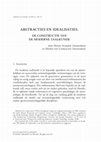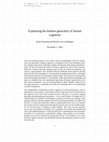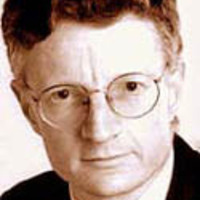Papers by Michiel van Lambalgen
KNAW Narcis. Back to search results. Publication Logic and Cognition (1998). Pagina-navigatie: Ma... more KNAW Narcis. Back to search results. Publication Logic and Cognition (1998). Pagina-navigatie: Main. ...

Abstracties en Idealisatie:De Constructie van de Moderne Taalkunde Martin StokhofMichiel van Lamb... more Abstracties en Idealisatie:De Constructie van de Moderne Taalkunde Martin StokhofMichiel van Lambalgen22 december 20091 Inleiding De moderne taalkunde is in bepaalde opzichten een van de opmerkelijkste en succes-volste wetenschappelijke vernieuwingen van de twintigste eeuw. De opkomst van degeneratieve grammatica in de jaren vijftig en zestig zorgde voor een sfeer van intellec-tueel enthousiasme die voorbehouden leek aan fundamentele ontwikkelingen binnende natuurwetenschappen. En het enthousiasme bleef niet beperkt tot de taalkunde zelf,maar strekte zich uit tot andere gebieden, zoals de filosofie, de in opkomst zijnde in-formatica en cognitieve psychologie, de antropologie, de letterkunde. En tot op de dagvan vandaag geldt de moderne taalkunde als model van wetenschappelijke vernieuwingvoor vele andere geesteswetenschappelijke disciplines.Een werkelijke verklaring van deze opmerkelijke ontwikkeling zal een aantalfactoren in ogenschouw moeten nemen. De rol die de natuurwetenschappen ...
Theoretical Linguistics, 2011
The paper addresses the way in which modern linguistics, − in particular, but not exclusively, th... more The paper addresses the way in which modern linguistics, − in particular, but not exclusively, the generative tradition − , has constructed its core concepts. It argues that a particular form of construction, reminiscent of, but crucially different from, abstraction, which is dubbed 'idealisation', plays a central role here. The resemblances and differences between abstractions and idealisations are investigated, and consequences of the reliance on idealisations are reviewed.
Law, Probability and Risk, 2007
We discuss the statistics involved in the legal case of the nurse Lucia de B. in the Netherlands,... more We discuss the statistics involved in the legal case of the nurse Lucia de B. in the Netherlands, 2003-2004. Lucia de B. witnessed an unusually high number of incidents during her shifts, and the question arose as to whether this could be attributed to chance. We discuss and criticize the statistical analysis of Henk Elffers, a statistician who was asked by the prosecutor to write a statistical report on the issue. We discuss several other possibilities for statistical analysis. Our main point is that several statistical models exist, leading to very different predictions or perhaps different answers to different questions. There is no such thing as a 'best' statistical analysis.

Let us start by thanking the commentators for their many thoughtful and critical comments. We are... more Let us start by thanking the commentators for their many thoughtful and critical comments. We are happy that the main thesis we set out to defend in the paper has given rise to such interesting observations and (counter)arguments. Most of them are critical of the analysis of the role of idealisation in modern linguistics, and have given us much food for further thought. Unfortunately, not every comment made by the commentators can be discussed separately. In what follows we want to keep the discussion as systematic as possible, and therefore we will group various comments under three headings, and address these topics as systematic issues, but of course we will refer to the arguments of the individual authors whenever this is relevant. The topics we want to discuss are the following. First of all, we want to be more specific about the scope of the analysis given in the paper: to what paradigm and/or part of modern linguistics does our analysis apply? (That is, if to any at all. . .). Secondly, we want to address various comments and criticisms regarding the nature of idealisation and the applicability of this concept to linguistics. Then we will address the question whether there is indeed a difference at this point between linguistics and the sciences. Fourthly, we want to further elucidate our use of the label 'ideological' in connection with how certain idealisations are motivated, and we end with a remark that addresses the actuality of our analysis. 1. The scope of the analysis As it states in its very title, the paper analyses the role of idealisations and abstractions as part of 'the construction of modern linguistics'. Several Comments-to-comments Martin Stokhof and Michiel van laMbalgen 1 Cf., e.g., Newmeyer and Stabler. Our use of 'modern linguistics' was correctly diagnosed by Haspelmath.
Kant considers his Critique of Pure Reason to be founded on the act of judging and the different ... more Kant considers his Critique of Pure Reason to be founded on the act of judging and the different forms of judgement, hence, take pride of place in his argumentation. The consensus view is that this aspect of the Critique of Pure Reason is a failure because Kant’s logic is far too weak to bear such a weight. Here we show that the consensus view is mistaken and that Kant’s logic should be identified with geometric logic, a fragment of intuitionistic logic of great foundational significance.
The logicians . . . are too much caught up in psychology . . . Logic is in no way a part of psych... more The logicians . . . are too much caught up in psychology . . . Logic is in no way a part of psychology. The Pythagorean theorem expresses the same thought for all men, while each person has its own representations, feelings and resolutions that are different from those of every other person. Thoughts are not psychic structures, and thinking is not an inner producing and forming, but an apprehension of thoughts which are already objectively given.

From an evolutionary point of view, what is most overwhelmingly in need of explanation is thegene... more From an evolutionary point of view, what is most overwhelmingly in need of explanation is thegeneralityof human cognition, as compared to that of our immediate ancestors. Humans sing operas, build diesel engines and agonise about domain dependence. Above all they can sustain the kinds of societies required for each of these activities. What part a domain specialist apparatus plays in this new-found encyclopaedic cognition is a good question. But we believe that the wholesale current appeal to domain specificity has led to the neglect of what should be the guiding observation—the hugely more general capacities for reasoning in human beings. The rejection of homogeneous universal learning mechanisms, or of monolithic universally interpreted languages and logics, as simplistic bases for explaining the generality of human cognition, has led to the ‘massive modularity’ view of reasoning (Sperber, 2002); (Sperber, 1994), but we will argue that this is a remarkably poor basis for explainin...
KNAW Narcis. Back to search results. Publication A logic of vision: preliminaries (2001). Pagina-... more KNAW Narcis. Back to search results. Publication A logic of vision: preliminaries (2001). Pagina-navigatie: Main. ...
Disclaimer/Klachtenregeling Meent u dat de digitale beschikbaarstelling van bepaald materiaal inb... more Disclaimer/Klachtenregeling Meent u dat de digitale beschikbaarstelling van bepaald materiaal inbreuk maakt op enig recht dat u toekomt of uw (privacy)belangen schaadt, dan kunt u dit onderbouwd aan de Universiteitsbibliotheek laten weten. Bij een gegronde klacht zal de ...
paper develops the formal foundations of semantic theories dealing with various kinds of nominali... more paper develops the formal foundations of semantic theories dealing with various kinds of nominalisations. It introduces a combination of an event-calculus with a type-free theory which allows a compositional description to be given of such phenomena like Vendler's distinction between perfect and imperfect nominals, iteration of gerunds and Cresswell's notorious non-urrival of'the train examples. Moreover, the approach argued for in this paper allows a semantic explanation to be given for a wide range of grammatical observations such as the behaviour of certain tpes of nominals with respect to their verbal contexts or the distribution of negation in nominals.











Uploads
Papers by Michiel van Lambalgen